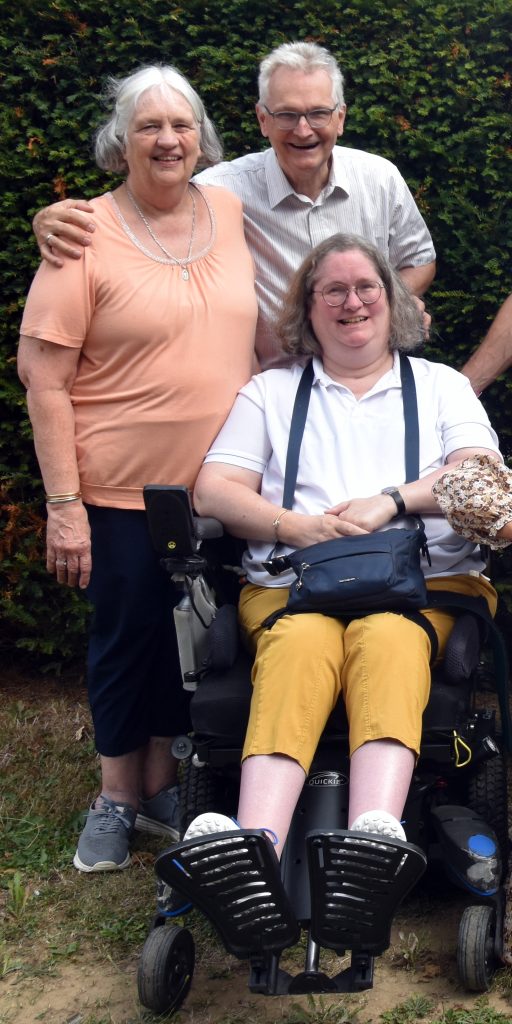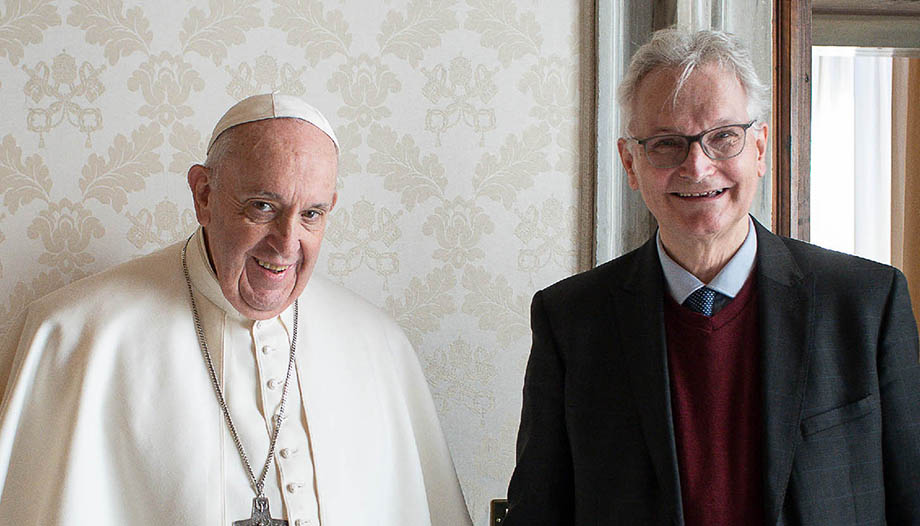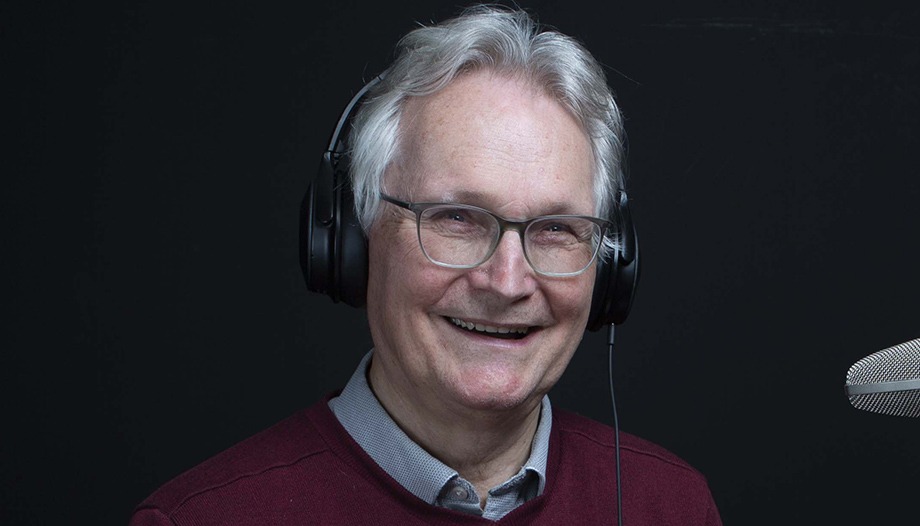Jean-Luc Moens is a layman, father of a family, known throughout the Catholic charismatic scene.
He was the first moderator of Charis, an institution erected on December 8, 2018 by the will of Pope Francis and which brings together various charismatic entities of the Catholic Church throughout the world.
During his term as moderator, Moens defended the importance of an authentic spiritual experience, unity among the members of the charismatic community and collaboration with other realities of the Catholic Church.
In 2021 he left his position as moderator of Charis to take care of his family, especially his daughter, who became seriously ill during that period.
How is your daughter?
- The same. He had a stroke, his heart stopped. It's not clear why it happened, but for a while he was not feeling well, and one day he fell to the ground, in front of his daughter. My daughter said to her daughter at the time, "Call the ambulance." When the ambulance arrived, his heart stopped. They gave her - as is normal in these cases - the resuscitation maneuver, only they did it for 45 minutes.... she was 42 years old at the time.

When she was still in a coma after the first stroke, her husband abandoned her. My daughter was left with nothing: she lost her body, her husband, her house, her children, her job. She lost everything. Now she has hemiplegia (paralysis of half of her body) on the left side; and her right leg does not work well either.
In addition, the stroke damaged her brain and she has lost her immediate memory, she forgets recent things. At some point, talking to her children, she says, "How was school?" -and they tell him- and after an hour, the same question, "How was school?". It's very hard for them because they don't understand what's going on.
At first, my wife and I looked for a place where we could take her in and take good care of her, with all the particularities that the disease entails, but they were all old people's homes and she is so young...so we transformed our house so that she could live with us. We put in everything electric so that she could open the doors, an elevator so she could go up to the second floor, etc.
I tell all this to say that, in spite of everything, I know that God loves me. And I see in this situation a plan of God for me. I don't know if we will see that plan here on earth, but we will certainly see it in heaven. We have to think about it this way, because if not, it is impossible to go on.
This year is the year of St. Therese of Lisieux and she always said in her letters: "Jesus has sent me this suffering, thank you Jesus". All this makes our faith grow. Without faith it is difficult to face difficulties. What the Lord gives us to live, is also to give witness and hope, because we must hope.
When Jesus asks his apostles, "Who do you say that I am?" Peter replies, "You are the Christ, the Son of the living God," and Jesus replies as if to say, "Well done, my Father has inspired this to you." But then he adds - "Now I have to go to Jerusalem to be rejected, imprisoned, crucified..." and then Peter says, "Ah no, not that."
We are like Peter: we want a glorious Christ, but we do not accept a crucified Christ. And this is also our vocation. Because everything changes if we see our life as a whole. I may live 80 or 85 years or die tomorrow, but it is not the end.
I see time on earth and time after death in a mathematical way: time on earth is a limited time that is inserted in an infinite whole, "timelessness". The important thing is to observe our life as a whole, so that what I live now will find its meaning and reward in the second part.
Regarding infinity, you are a mathematician. This idea of infinity, the concept of eternity, how do you understand it? How can you accept that infinite, eternal time, to which we all aspire?
- Someone said "Eternity is very long, especially at the end" (he laughs). I think a lot about eternity: we humans live inserted in a concrete time, and we don't have the capacity to imagine what eternity is like.
But, as a mathematician, I explain it to myself as follows: We live in three dimensions: the first dimension is linear, it is time, like a horizontal line. If we add a second dimension, a vertical line, we would have space. And with these two conditions of time and space it is possible for movement, the third dimension, to exist. If we leave for a moment those three dimensions (space, time and movement) and we see everything from outside, we would be in a fourth dimension, and if I am outside these dimensions, I see everything in an instant.
This is God for us: he is outside space-time and sees everything in an instant. Eternity is an instant and a present that never ends. But it is a present, not a waiting.
Because if we think of eternity as a time that does not end, we would not want to go, because we would find it boring. That said, it remains a mystery to human eyes.
Mathematician, married, with 7 children and 13 grandchildren. Your vocation came late in life. What is vocation for you?
- Call. "Vocare" is "to call." I am convinced that God calls each one with a unique plan. God never does things in series, each one is unique. What is holiness? It is to become what God wanted me to be. The saint is the one who fully realizes his vocation.
Carlo Acutis used to say: "Everyone is born original and unfortunately they die as photocopies". The saint is the one who remains original, and that is our vocation.
For me vocation is not just knowing if I will marry, if I will be a priest, etc. Certainly, it is part of the vocation, but vocation is also my place in the Church, what the Lord asks of me, my mission, how I am called by Him to serve - to serve Him - in the world. In this sense there is an infinity of vocations, and that is the beauty of it. Clearly the fulfillment of my vocation is to be married, to be a father, grandfather, etc., but my vocation is also to evangelize, to make God known.
Vocation implies something broader, more extensive and that I freely accept. It is not that God has called me and put me on rails like a train that follows a pre-established path and does not go off the rails. When one takes another route that perhaps is not the one God wants for him, God adjusts his plan in some way.
I also feel very fortunate to live at this time in history. Because in this time, after Vatican II, as a layman, I can be sure that my vocation is holiness. As a layman, I have been an evangelizer all my life.
Forty-five years ago I spoke to a priest, and I said, "I would like to be a missionary," and he said, "But you are married and have children, that is impossible." But it was possible. I was chosen to evangelize full time. What an immense grace! We are all called to be witnesses of the Faith in the world, but I had the grace of being able to do it full time, in community. And this is a gift from God in my life that I thank Him for every day.

This "call", this mission that you mention, becomes a reality in your life through the community to which you belong, the Emmanuel Community. What is the charism of this community?
- Like any charism it is difficult to explain in a few words, but we can say that the basis is the outpouring of the Holy Spirit. And this outpouring has changed my life. I was a Christian because I was born into a Christian family: I went to Mass every Sunday and prayed the three Hail Marys at my bedside every night, nothing else. Then I received the outpouring of the Holy Spirit and began to have a personal relationship with God, with Jesus. Jesus became a person for me, with whom I talk a lot. And to whom I also try to listen (he laughs).
Our community was born from the outpouring of the Holy Spirit and, together with this, the moments of fraternal sharing with the other members of the community are important. In fact, the vocation of Emmanuel is to make God known to all people, whether they are far away or close to the Church. Its members are committed together to live adoration, compassion for the needy, evangelization, communion of states of life (laity, priests, consecrated together) and the special devotion to Therese of Lisieux to advance on the path of holiness.
Because how does the Spirit speak? Often we would like to hear the voice of God: "Jean Luc, you have to do this", but usually we don't. I have heard the voice of God in my life, but the normal thing is to listen to the brothers. I have heard the voice of God in my life, but the normal thing is to listen to the brothers and God speaks through the brothers.
I always like to make a comparison: What is a community charisma? It is like a cocktail. The Church is like a wine cellar where all the ingredients are, all of them belong to the Church. Each community takes certain ingredients in different quantities.
For example, if we take the ingredient of poverty, evangelization, love for the Church, and mix it well, we have the Franciscans. If we add preaching, study, we have the Dominicans; and if we take the outpouring of the Holy Spirit, fraternal life, adoration, compassion for the poor... we mix it all well. et voilàThe Emmanuel Community. Which is unique. But in every cocktail there is a base liquid or main ingredient: for us it is the outpouring of the Holy Spirit and fraternal life.
A community charism is, in fact, a path to holiness. I entered a community to be a saint, nothing less. I want to be a saint. And with our particular charism and together with my brothers, and through the other elements that I have already mentioned, I travel a path of holiness, but, which lasts a lifetime obviously, it is not that when I entered, I became a saint, it is a path and that is my true vocation. And this gives me immense joy.
You were the moderator of Charis until you decided to leave your position due to your daughter's health problems. Do you consider the family the first place where your vocation materializes?
- Of course. My first place of holiness, of this calling, is my family, and first of all my wife. I didn't get married to be out doing other things. I believe that the vocation to holiness, wherever it may be, is lived above all in the family; I cannot become a saint far from my family, or from my wife. in spite of my family.
No, I can become a saint because I am married, I am a father, I am a grandfather, and that is where the Lord is waiting for me, and when I said that the Lord speaks through the brothers, the Lord speaks to me through my wife first of all, because I cannot listen to others without first listening to my wife.
I believe that we have reached a moment in the history of the Church in which this call to holiness of the laity, of married people and of the family as a whole, is becoming clearer and clearer.
I see that awareness of family sanctity is beginning to emerge: the Ulma family, for example, a Polish family, will be beatified all together, as a family: the parents and the six children and also the seventh child they were expecting.
Another example is the Rugamba family in Rwanda - I am helping in the cause of beatification and I hope they will be beatified soon - and so many other examples that are making it clear that married life is also a call to holiness, and the Church wants to give this sign to married people.
I don't want to go to heaven without my wife. And I want all my children, even my children-in-law, all of them, to go with me to heaven. And that's why I pray for each one of them every day.








